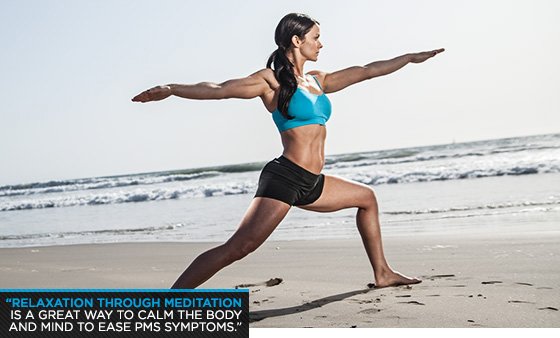"That time of the month" can turn even the most polite princess into a complete ogre. Many women experience severe symptoms not only during menstruation but also in the weeks leading up to it. Mood swings, cramps, bloating, fatigue, and headaches can take their toll, but enough is enough!
PMS shouldn't get in the way of your daily activities. Nobody should have to spend the whole day on the couch with the lights down and a heat pad on. Try these four helpful methods for reducing the pain and discomfort!
Even if you don't suffer from severe symptoms, these methods can help keep you going throughout that "fun" week.
1 / Keep on Trucking
Pain and fatigue can make you feel like you should skip the gym, but don't! Exercise improves circulation, which can help reduce cramps and headaches. It also releases endorphins for a feel-good high and a boost of energy.
Try exercising 30 minutes at least a few days each week. You'll feel much better. Keep it fun. Run, swim, lift, hit a yoga class, or just take Spike for a walk.

2 / Banish Bloat
Bloating associated with PMS is uncomfortable and can interfere with daily activities. There are a few ways to reduce water retention and eliminate that heavy feeling. First, drink lots of water. Although it might seem counterintuitive, water will actually keep you from bloating.
If you're dehydrated, your kidneys tell your body to hold onto water. If you need help getting that much water, eat hydrating fruit like watermelon and oranges.
Next, reduce your salt intake. Salt causes your body to retain water and caffeine and carbonated beverages can also cause intestinal distress and bloating.
Third, eat clean and healthy foods rich in potassium, calcium, and magnesium, like celery, asparagus, and cucumbers.
3 / Try Natural Supplements
Not everybody loves running to the drugstore for bottles of pills. If you want to keep it pharmaceutical-free, try some natural supplements.
A calcium supplement may effectively curb PMS symptoms. It may help relieve headaches, mood swings, and muscle cramps. For best results, try 1,200 mg per day1. You can also take magnesium, which may reduce muscular contractions, ease cramps, and reduce fatigue.
Chasteberry, or Vitex, is another great option for manage your PMS symptoms. It reduces symptoms of irritability, depression, headaches, and bloating. In a study, subjects consumed one 20-milligram tablet per day to ease symptoms2.
This herb is particularly helpful to prevent breast tenderness by decreasing the release of prolactin from the pituitary glands.
4 / Take a Chill Pill
Another natural method to relieve PMS symptoms is through relaxation techniques. Acupuncture is an ancient medical treatment used to treat a variety of health conditions. It increases circulation to ease menstrual cramps and promotes increased natural endorphin release. As with a killer workout, you'll feel great almost immediately.

Relaxation through meditation is another great way to calm body and mind to ease PMS symptoms3. Take some time for yourself anytime of the month, but especially while you're menstruating. Allow your body to go through its natural process.
Menstruation can be a painful, uncomfortable inevitability for many women. These strategies should ease many PMS symptoms, but they are not fix-alls. If you grapple with excruciating pain every month and nothing seems to be helping, go see your physician.
These are some of the top natural remedies to help you manage and potentially ease your PMS symptoms. Start using two or three of these techniques yourself and you should notice significant improvements in the way you feel throughout this 7-14 day period.
References
- Jurgens, TM. (2009). Herbs, vitamins, and minerals in the treatment of premenstrual syndrome: a systematic review. Canadian Journal of Clinical Pharmacology, 16(3).
- Schellenberg, R. (2000). Treatment for premenstrual syndrome with agnus castus fruit extract: prospective, randomised, placebo controlled study. BMJ. 322:134.
- Albert J. Arias, Karen Steinberg, Alok Banga, and Robert L. Trestman. The Journal of Alternative and Complementary Medicine. October 2006, 12(8): 817-832. doi:10.1089/acm.2006.12.817.
